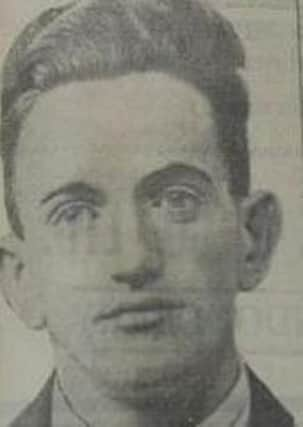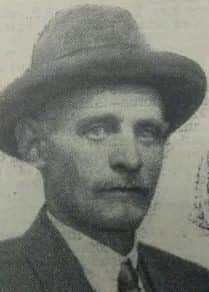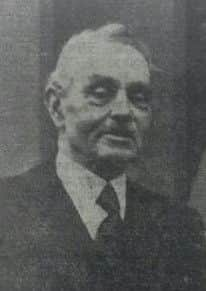Derry's role in the War for Irish Independence


From the outset, it is made clear that Mr Brady’s story of the city’s part in those turbulent years was by no means a complete record. In fact, the author specifically states that he is recounting the tale of his involvement in the actions and incidents of those days. Nevertheless, his writing provides a fascinating insight into what was going on in Derry at this time. What follows is the first in a series of articles recalling Liam Brady’s work as the centenary of the Easter Rising of 1916 approaches.
The first of Liam Brady’s recollections appeared in the ‘Derry Journal’ on May 1, 1953. He wrote: “In giving my narrative of events in Derry City between the years 1915-21, I do so with the intention of encouraging others to make known any authentic material or historical facts that they may have of these grim but glorious years when, in spite of overwhelming odds, the IRA carried on and forced the greatest Empire the world has ever seen to seek a truce.
Advertisement
Hide AdAdvertisement
Hide Ad“I hope also to refresh the memories of the older generation and to let the younger generation and the older generation know that they have inherited a great and glorious tradition, which I hope they will pass on unsullied until the flag of the Republic flies freely over the thirty-two counties


of Ireland.”
‘The Beginning’
“In my early youth, I was often lured away from my parents and lost in the crowds that followed the local bands and their many tours round the streets of the city. I loved all the marching tunes, but ‘O’Donnell Abu’ was my favourite. It made me feel that I was more than a spectator, for, with chest out, shoulders back, I would try to keep step with the band as if obeying orders from some officer whom I likely respected, and, thus, left-right, left-right, I would parade for hours
through the town.


“The desire for marching and drilling got into my blood and, without knowing the reason why, I kept looking for somewhere I could drill,
drill, drill.
“At school, a chum of mine told me that a physical drill class was taught at classes in the Christian Brothers School on Sunday afternoons. So, off I went each Sunday at 3 o’clock to attend these classes. A man named Seamus Cavanagh was our drill instructor and Paddy Hegarty would give us lectures on Ireland’s glorious past. He told us of Fionn MacCumhaill and the daring exploits of the Fianna, of the coming of the English and the destruction of our Irish industries and the methods they had been using for about 700 years to destroy our Irish language and culture.
Advertisement
Hide AdAdvertisement
Hide Ad“He also told us that the spirit of the Fianna of old was alive today in Fianna na hEireann (Boy Scouts of Ireland).


At last, I thought to myself, this is what I have been dreaming about. I must become a member of this splendid organisation. So, after doing physical drill each Sunday, until I believed I had all of the commands off by heart, in high spirits off to Sackville Street where the Fianna had its
headquarters.”
The classes that Liam Brady speaks of here were connected to an Eire Og movement for boys initiated in the first decade of the twentieth century run by Derry men such as Charlie Breslin, John Keys O’Doherty, Eamonn McDermott, Seamus Murrin, Pat Hegarty and Seamus Cavanagh. The Christian Brothers gave use of their schools at Brow of the Hill on Sunday afternoons and there was a membership of around 400. There were classes in the Irish language, Irish history, Irish prayers, singing and recitation and an interval for physical drilling in the grounds. The class had many visitors, most notably Sean T O’Kelly, who would later become President
of Ireland.


Meanwhile, the young Liam Brady found himself walking up the stairs of Fianna headquarters. He wrote: “Up I went and presented myself to Joe Flanagan, who was one of the founders of the organisation in the city, but when he saw me, a lad of thirteen and looking rather small and puny for my age, he said he was sorry but I was too young and too small. ‘Call back in about a year’s time and we will see,’ he said. My heart fell to my boots. I could have cried, but I kept a stiff upper lip and without saying one word left the room. My dreams had been shattered and I never attended those Sunday classes again.”
The Ulster Volunteers
Advertisement
Hide AdAdvertisement
Hide AdThe tale then moves to 1913 when things in Ireland began to take a politically ominous turn when it became apparent that the British Government looked intent on giving Ireland a degree of autonomy under Home Rule. Unionist reaction to this was to form the Ulster Volunteer Force in January of that year.
Liam Brady recalled: “With the boys of Waterloo Street, where I lived, we would play children’s games, hide and seek being very popular with us. We would go to the United Irish League Rooms at the bottom of the street and there we would hide by mixing with the men who gathered around the fire chatting. Sometimes we forgot to return to our playing and would sit listening to the older men discussing the Irish question. They talked of Home Rule and the Redmondite Party. We did not know what it was all about. We only knew that Home Rule meant some measure of freedom for Ireland, and we were for it.
“We would talk about the Ulster Volunteers and their leader, Edward Carson, who they said had gone to Germany to get rifles and ammunition for his army. Some would say that he wined and dined with the Kaiser who was the King of England’s cousin. We heard all about the landing of the rifles at Larne. This all seemed very confusing to me as I couldn’t make out whether Carson was for England or against her. I was too young to understand the political game that was
being played.
“On other occasions, we heard about the formation of the Irish Volunteers and from the conversations we learned that this organisation was formed as a counter-blast to the Unionist Volunteers and to make England keep her word about giving Home Rule to Ireland. I learned later that the Irish Volunteers had no intention of attacking the Ulster Volunteers. As the months passed by, the sound of marching feet could be heard all over the land. Companies were formed in various parts of Derry and soon hundreds of able bodied men were openly drilling in our city.
Advertisement
Hide AdAdvertisement
Hide Ad“I loved to see the marches and attend the field-days and sports, when Commandant McGlinchey, after inspecting his troops, would ride-off on a white horse wearing his Sam Brown belt and sword. My youthful heart was filled with excitement and the old flame of wanting to drill and parade was once more burning fiercely within my breast.
“I felt very proud when I saw my uncle William (whom I was called after) taking charge of his company of Volunteers. He was stout and well built and his green uniform with sword attached and his commanding voice made him a most suitable person for the job. I watched Carson’s Volunteers as they passed through Waterloo Place carrying their Mauser rifles on their shoulders. They looked a fine body of men and seemed to be well drilled.”
“I remember when the Irish Volunteers left Derry by train for North Donegal and had a sham battle with the Inishowen Volunteers on the sand dunes at Ballyliffin facing the sea. The Irish Volunteers also had a summer training camp at Ludden about ten miles from Derry and the men were going there in large numbers to practice rifle-shooting and the usual camp drills.
“It was during this period that the guns of war started booming and England and Germany were plunged into a conflict that long had been foretold. In Ireland, the Redmondite Party had suceeded in gaining control of the Irish Volunteers, pledged their support to the British Government and started recruting an Irish Brigade for the British Army.”
Next Friday: the Irish Volunteers split and how it affected Derry City.